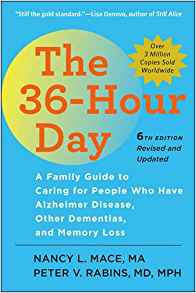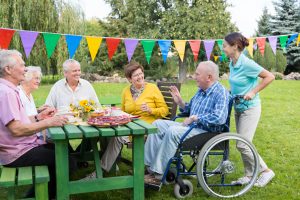The Long Road Down a Dementia Diagnosis
One of the most feared circumstances of life today is a diagnosis of dementia in a loved one or in ourselves. It may start out as an admission of forgetfulness, evolving into a diagnosis of Mild Cognitive Impairment. Some patients never go beyond this rather tame diagnosis of MCI, remaining at the mild stage for the rest of their lives. But most people progress to the more severe stage of the disease. If there is no dementia in your family, you probably know of a member of another family who does have it.
There are many forms of dementia, Alzheimer’s Disease (AD) being the most recognizable. Whatever the specific diagnosis, the realization of what is to come strikes fear into the hearts of sufferers and families. The sufferer loses not only memory but function, not only cognition but personality. The body loses the memory of how to operate itself. At the present time, there is no cure for dementia.
How do we survive the long, drawn-out process that dementia in your family takes us through? How do we help a loved one through the process? How do we explain the illness to younger family members who may not understand why Grandpa or Grandma is acting so strangely?
>READ: WHEN MEMORY FADES: PLANNING FOR CARE
My husband John passed away in February of 2017 from complications of dementia. Perhaps my experiences and observations can be of some use in helping other people through the process of surviving dementia in your family including the death of a spouse or loved one.
Anticipation
I was 10 years younger than my husband. I always expected to outlive him. I always expected to take care of him and be with him when he passed away. And it came to pass exactly that way, so this process was not a surprise. Couples nearer in age to each other may not have thought about “who will go first” because circumstances are not readily apparent. Couples not only need to talk about this, but they also need to have their legal and financial affairs in order.
Family History
Is there dementia in your family? My mother-in-law suffered from dementia, so her three children are at risk, and so are the grandchildren to some extent. It never hurts to be aware of the living arrangements and life circumstances of the elderly members of your family. Is someone living by themselves and able to take care of themselves, or do their personal habits become lax and their medical necessities dismissed as unimportant? Understand, accept, and deal with your particular family dynamic.
Testing
In the beginning of cognitive decline, it is often easy to get a loved one to take some initial tests. Because my husband’s mother had suffered from dementia, we told him that we wanted him to get a “baseline” cognitive exam for comparison in the future. He was amenable to that, since we weren’t approaching it with a “you are sick, you need to have this test” point of view. It was also recommended that we join some kind of support group, and because my husband was a veteran, we were able to sign up for the MCI (mild cognitive impairment) support group at the VA hospital in Palo Alto, California.
Support Group
This MCI group that met every other Wednesday was exceedingly worthwhile since we got to know people – as singles and as couples – from all over the Bay Area who had family members in different stages of the disease. We met sons and daughters as well, and our daughter accompanied us a few times to learn what lay ahead. Patient mindset ranged from acceptance to total denial, and we learned much more about the brain than we ever thought we would. Patients included both men and women, with frankly the women being more in denial than the men. Stories we heard were funny and sad at the same time, but the sharing of experiences was invaluable. Many local hospitals and clinics have established support groups for families dealing with dementia.
Driving
The most difficult time we had emotionally involved the issue of driving. We could see that his driving skills were deteriorating, but we didn’t quite know what to do about it. A stop by a policeman in wine country for his driving too slowly finally convinced us we needed to take some steps. Have you ever tried to tell a retired airline pilot that he can’t drive a car anymore? Not fun. We finally had his neurologist fill out a form that we attached to a request to the Department of Motor Vehicles to suspend his license. My husband thought he would be allowed to take and pass the written and driving tests, but he didn’t get that far. The DMV yanked his license immediately upon receipt of our letter and the doctor’s recommendation. He was quite upset for a while. After a few months, he allowed that it was kind of nice to have us drive him around anywhere he wanted to go.
Respite Care
Since the evolution of dementia can take some time, there are many avenues of assistance that can be explored. In the early stages, the spouse can do all the caregiving – being more patient, spending more time with the family member, making sure that others in and out of the family understand the situation. When my husband was in the early stages of the disease, we threw him a 75th birthday party, ending up with 75 people in our back yard. He was touched and said that he didn’t realize that he “had so many friends.” He was able to give a short but wonderful speech before blowing out the candles (not 75!) on his cake.
As the months passed, an opportunity arose to take the next step in home care. My newly-single stepdaughter was available to come live with us and assist me with his care. This arrangement was perfect for all three of us because he was kept mentally and physically active, I was able to take some time for myself, and my stepdaughter received a small income. Her job was to get him up and showered and dressed in the morning while I ran errands.
 Everyone in the family did what we needed to do as far as self-education was concerned. Our favorite book was “The 36-hour Day” by Nancy Mace and Peter Rabins. There are several good books available on Amazon — utilize your favorite browser to see the books that best apply to your situation.
Everyone in the family did what we needed to do as far as self-education was concerned. Our favorite book was “The 36-hour Day” by Nancy Mace and Peter Rabins. There are several good books available on Amazon — utilize your favorite browser to see the books that best apply to your situation.
There came a time when we all needed some respite. When my stepdaughter went to work part-time at a local daycare, we availed ourselves of home health care services. It was great to have others keep him company and get him out for a walk around the block. There is usually a 3-hour minimum for these types of services, and for us, it was well worth it.
Residential Placement
I feel fortunate that my husband had a relatively normal experience with dementia. Although he took many medications for various things, he was never in any excruciating pain.
Many people have a “line in the sand” that determines when to consider residential placement for a loved one. I had two criteria. The first one was fear – whether or not he was afraid of us. That line was never crossed. To his dying day, he was never afraid of us, even though he may not have recognized who we were. Also, he was never violent. In fact, it was something I didn’t even consider. I had never seen him violent in all the years we were married. My second criteria was continence. I struggled with this for quite a while and eventually sought residential placement.
Of course, he didn’t like it. He always asked when he was coming home. Family and friends in the immediate area visited him as often as possible. We were able to take him out for medical appointments, and we looked forward to musical entertainment and beverages (of all types!) at the Friday afternoon Happy Hour. After a hospitalization and a change in residence, he settled in quite nicely and enjoyed his second residence more than the first one.
The two residences where he lived had many social activities for residents and families. He was a favorite among the attendants at his second residence, even though he sometimes pushed furniture around. We told him he could push chairs around unless there was a little old lady in the chair. He just laughed! Including families in residential activities is very important. Since the patient can’t always join the family at home, it is vital that family members become a part of the activities of the residence. Keeping up the spirits of the families is just as important as keeping up the spirits of the residents, and a residence that emphasizes family involvement usually scores high in patient care.
Gathering at the end
Eventually, the time came when the brain was no longer able to take care of the body. His six children gathered from all parts of the country to visit him in the rehab center during his last days. Although it was a time of sorrow, it was also a time of togetherness and family reunion. Together we planned a nice celebration and reception at a local venue. We arranged for several speakers – our daughter, John’s brother, and a fellow retired airline pilot. Friends eagerly came forward to tell a humorous “John story.” Two friends sang, one friend played the violin. It was quite a ceremony! As was previously said, I didn’t know he “had so many friends.”
Widowhood
The most exasperating issue of dementia involved the paperwork of a spouse who has passed away. Social Security. Insurance. Copies of death certificates to banks and others who need them. Many businesses you deal with have a good list of things to be done after the death of a spouse. Our credit union sent a wonderful brochure on how to organize the next chapter of life. Because I always paid the bills, I didn’t have to learn the ins and outs of family finances. I always took care of the house and yard, so that was no problem. So what did my husband do in his retirement? He collected things and helped people. The second activity was very worthwhile, the first – not so much. Eighteen months after his passing, I had finally cleaned out the garage enough to actually put a car in there. Will wonders never cease….!
Afterthoughts
I loved my husband. Still do. I feel his presence every day. I believe we all have souls that survive the physical death of the body. But I was not afraid to let go. My life is now mine to direct. I have one child and five stepchildren. As spread out as we are, we try to keep in touch. I am trying to discard things of the past that will not be a part of my future. If something is really important, it will live in my heart and not necessarily in my garage! I keep up old friendships. I make new friends.
One thing I did find that annoys me to no end, and that’s when people feel the need to express excessive condolences. I am past being sorrowful over my husband’s passing. He was 80-years-old. He had a good and exciting life. He had six children, two grandsons, and one great-granddaughter. He never met someone who didn’t become a friend. He was a fortunate man. I am not sorrowful that his life was successful and that he went on to the next stage of existence without me. One of these days I’ll catch up with him and we will compare experiences. And that will be a wonderful day!
>READ: ELDERCARE: WILL YOU BE READY?










